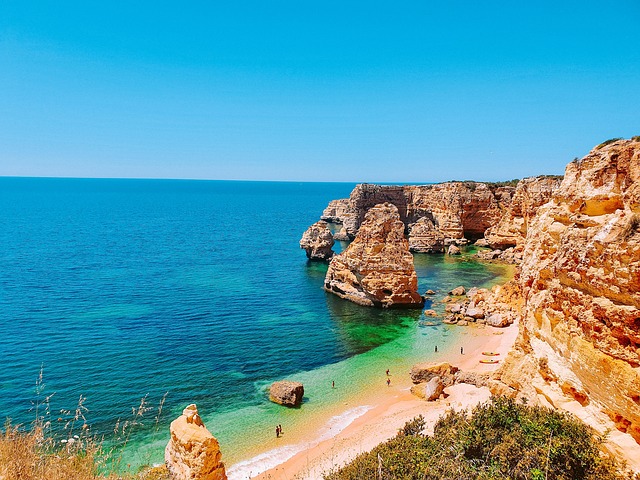Algarve: Where Language Turns a Trip Into a Memory
With summer travel peaking and August just around the corner, many Americans are setting their sights on Portugal – and more specifically, they have the Algarve somewhere near the top of their itinerary. It makes sense – it’s gorgeous, affordable, and sunny in all the ways you want a vacation to be. But there’s a layer to the experience that many never quite reach. And honestly, it’s not their fault. It’s just that nobody really tells you how different the trip feels when travelers can actually speak – even just a little – of Portuguese of Portugal. That’s why Conversa Portuguese has become a valuable resource for many, helping travelers bridge that gap before they land.
We often assume that English will get us through. And sure, it will – in restaurants, hotels, and probably at the rental car desk. But when you step outside that bubble, things shift. You start to notice how the rhythm of the day, the way people greet each other, even the menus – they’re all tinted by the language. And if you don’t speak it? You miss a lot. Maybe not the big sights, but the little things. And those are often the best parts.

What travelers gain from speaking Portuguese of Portugal in Algarve towns
Lagos: Casual Vibes with Unexpected Depth
Lagos is easy to love. It’s got cliffs, coves, surf, and a town center that feels both lived-in and laid-back. Walk into a bakery at 9 AM and you’ll see surfers grabbing coffee next to grandparents reading the paper. And while you can get by pointing at what you want, there’s something cool about saying, “Um café e uma torrada, por favor.” (A coffee and toast, please.) You’re not showing off – you’re just showing up with a little effort. People notice that.

Albufeira: Tourist Central, But Still Real
Let’s be honest – parts of Albufeira are built for tourists. Loud bars, English breakfasts, menus in five languages. But step a few streets off the beach, and suddenly you’re hearing Portuguese again. Real Portuguese of Portugal. The kind where knowing how to say, “Desculpe, isto tem carne?” (Does this have meat?) can save you from ordering something completely unexpected. Google Translate works, but you won’t always want to pull out your phone mid-conversation. That’s where learning ahead helps – even if it’s just the basics.

Faro: The Quiet Gateway
Faro is where you land, but don’t rush through it. The old town has charm that doesn’t scream for attention. Sit in a small square and you’ll hear kids playing, church bells in the distance, maybe a cat stretching in the sun. Say “Bom dia” (Good Morning) to someone passing by, and more often than not, they’ll say it back with a smile that feels like an invitation.

Portimão: For Seafood, Boats, and Long Afternoons
If you’re into grilled fish, riverside walks, or boat rides that turn into full-day adventures, Portimão is your spot. Ordering lunch in Portuguese – even just attempting it – changes how you’re treated. It’s subtle, but real. You become less of a customer, more of a guest. Nobody expects you to be fluent. But making the effort? That speaks volumes.

Tavira: A Different Pace
Tavira feels like a postcard that no one else discovered yet. Ferries to quiet islands, markets with fresh fruit, tiled buildings that look untouched by time. It’s also a place where knowing how to ask, “Quanto custa?” (How much is it?) or say, “É muito bonito aqui.” (It’s very beautiful here.) goes a long way. Especially in spots where Wi-Fi isn’t great and no one’s really used to tourists needing help in English.

Do Travelers Really Need to Learn Portuguese of Portugal?
Strictly speaking? No. You can absolutely enjoy the Algarve with zero Portuguese. But the real question is: “What kind of trip do you want?” If you’re just looking to relax, get some sun, and maybe post a few photos, English is enough. But if you’re hoping for something richer – conversations, discoveries, the kind of memories that come from being present – even a little Portuguese of Portugal changes the game.
And we’re not talking grammar drills or five tenses in one week. It’s more like: how do you say “May I ask a question?” politely? How do you ask for directions without sounding robotic? What’s the local way to compliment a meal? These are the kinds of things you don’t get from a phrasebook app. You get them from real practice, in real situations, ideally guided by someone who knows the rhythm and nuance of Portugal – not just the language, but the culture behind it.
Why Travelers should learn European Portuguese Before They Land
There are platforms that get this. Some were built exactly for travelers like you – Americans curious about Portugal, wanting to learn the European version of the language, not the Brazilian one most apps default to. One in particular, Conversa Portuguese, offers lessons that feel more like conversations than classes. Highly qualified teachers, with years of experience, real-world scenarios, even cultural tips that help you avoid awkward moments at dinner. Let’s just say: they know what they’re doing.
And no, it’s not about being fluent. It’s about feeling comfortable enough to try. Because once you say that first phrase – even just a hesitant “com licença” (excuse me) – something shifts. You’re not just visiting anymore. You’re participating.

Learning European Portuguese Isn’t Just Communication – It’s Connection
Portugal is many things: beautiful, welcoming, full of flavor. But what makes it unforgettable isn’t just what you see – it’s how you feel while you’re there. The language is part of that. It opens doors, softens interactions, makes a stranger feel like a neighbor. You don’t need to master it. Just start.
